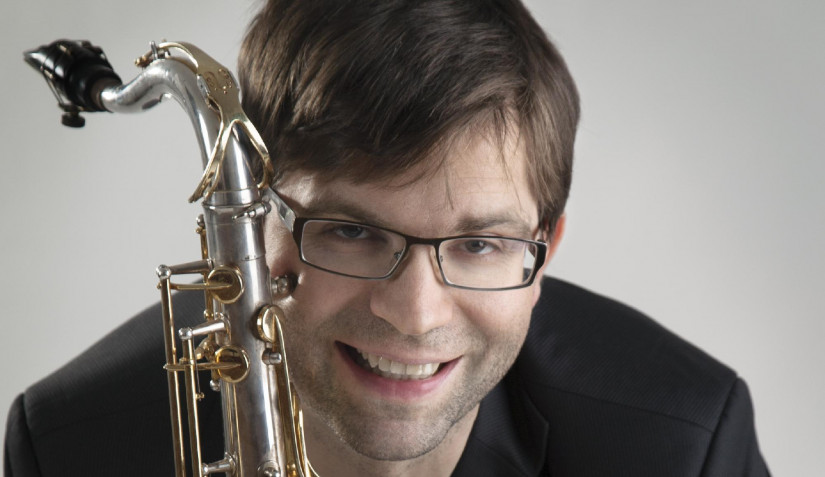The joy of making music together
“I would like to see a vibrant community at the department,” says Kristóf Bacsó, newly appointed head of the Jazz Department at the Liszt Academy. “It’s strange to talk about this now, because of Covid, but we’re going to come back from this state as soon as it’s possible. I will do my best to have a more active department than ever before, with lots and lots of making music together.”
The situation of the Jazz Department is made more difficult by the fact that it is located in the Köztelek Street building of the Liszt Academy, far away from the main building on Liszt Ferenc Square. But at the heart of the new department head's plans is more collaboration, and a closer connection between both the musicians and the subjects.
“I have been teaching at the Liszt Academy for 9 years, and I am well acquainted with the operation of the department. My predecessor, Károly Binder, led the Jazz Department for more than twenty years, doing a fantastic job, as did my other colleagues. At the same time, the department is ready for renewal, and my fellow professors and I have come up with a lot of ideas regarding that. Great educators make up the teaching staff, and I frequently work together with many of them, some of them also having taught me as a student years ago. My goal is to work with my colleagues to create a workshop where everyone can share their ideas with the community.
I feel it is an important task for me to create an more organic connection between theoretical and practical subjects. What students have learned in jazz theory, classical music theory, orchestration, and jazz history classes should be practiced by students immediately afterwards, even together – since pretty much our whole lives are about improvising together. This is exactly what theoretical objects should better support.
I am also planning new subjects. I am reluctant to say the word ʻcompulsoryʼ, but I would like to see all non-percussion students learn to play a rhythm instrument, as well. I think it is very important that they also practice the basic rhythmic formulas, pulsations, for at least one, ideally two semesters.

The other reform measure affects the other students of the Liszt Academy, who have not been studying improvisation for some time now, as this subject has been discontinued for classical musicians. I hope we can reintroduce it for non-jazz students soon. I also plan many other collaborations with the other departments - we are already in talks with Balázs Fülei, the head of the Chamber Music Department, about the practical aspects of that. The fusion of genres is trending now, for example, jazz reflections on a piece by a classical composer can be very exciting, but I also want to establish such collaborations with the Folk Music and the Composition Department – that is, to involve classical and folk music students in the world of improvisation, which is at the heart of our musical activities, and our students to experience other musical genres, as well.
I hope that this will also cause the Jazz Department to be actively present in the life of the university, so that we can work together on as many projects as possible and create joint concerts. Playing music together is incredibly exciting, and that’s exactly what I like most about teaching: it’s very inspiring to work with students. No matter how young I feel, they are still younger than me. I really enjoy making music together, and them seeing a lot of things differently keeps it fresh for me. The jazz scene is changing at an incredible rate, and there are already so many good performers in so many parts of the world, representing so many different styles, that it’s almost untraceable. My students may be able to show me something I’ve never heard before, they know a lot of performers I don’t – of course they also may not know some others who I think they should, but that’s why I’m there for them.
Teaching improvisation is especially exciting, in fact, I teach melody-making techniques, which are not unknown practices in teaching composition. Students need to learn and make instinctive the way one creates a melody and develops it into a longer musical thought. Collaborative experimenting skills can also be developed. We often improvise together: mainstream jazz is actually about improvising a melody, or longer musical contexts, for a particular musical form. There is no right or wrong solution here, although there are tangible flaws: let’s say if someone is playing an inappropriate sound in a particular harmonic context, of course I correct it. But that is not the purpose of this subject, there are other subjects for that, where students learn which sounds belong to a given chord and which do not. I’m more interested in how they can create a story from all this, create meaningful and coherent musical sentences. During that process, there are many creative tasks to come up with, which can teach them to listen and think before they play music.
For the time being, we are still in the plannig phase, and due to the situation caused by the pandemic, we can do nothing else. We can’t play music together online, it doesn’t transfer well with current communication systems, there’s also a minimal but percievable delay in sound, so we can’t work like that. We have one-on-one education, or everyone records their own part and we use the tracks for improvisation. Unfortunately, the students are also getting tired of this situation, their motivation is decreasing, and I can fully understand that. For now, however, I have no idea what to do with this situation, we don’t know what the future brings. We hope that our lives will soon return to normal. ”
Ágnes Mester


